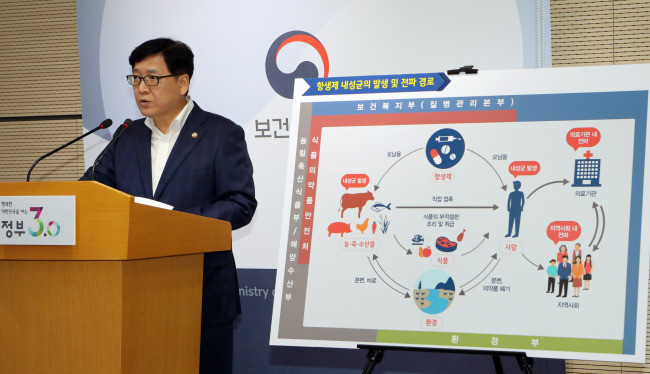South Korea’s health authorities on Thursday announced their plans to reduce antibiotics use for common viral infections -- such as colds and sore throats -- in response to concerns on the growing resistance of diseases to antibiotic medicine.
South Korea currently has an unusually high usage of antibiotics -- a group of drugs used to treat bacterial infections -- compared to other countries, partly because of inadequate public health education on antibiotics and antibiotics resistance.
“Antibiotics are very important durgs when treating infectious diseases,” Health Minister Chung Chin-youb told reporters.
“However, emergence of bactaria that are resistant to antibiotics is one of the serious threats to humanity today. Such bacteria are just as dangerous as incurable infectious diseases. In order to tackle the issue, we need to stop the ongoing overuse of antibiotics.”
As of 2014, 31.7 Koreans per every 1,000 were being prescribed antibiotics daily. The rate is significantly higher than the average for countries of the Organization for Economic Cooperation and Development, which was 23.7 per for every 1,000 individuals.
In Sweden, only 14.1 individuals per every 1,000 were being prescribed to the medicine every day.
South Korea currently has an unusually high usage of antibiotics -- a group of drugs used to treat bacterial infections -- compared to other countries, partly because of inadequate public health education on antibiotics and antibiotics resistance.
“Antibiotics are very important durgs when treating infectious diseases,” Health Minister Chung Chin-youb told reporters.
“However, emergence of bactaria that are resistant to antibiotics is one of the serious threats to humanity today. Such bacteria are just as dangerous as incurable infectious diseases. In order to tackle the issue, we need to stop the ongoing overuse of antibiotics.”
As of 2014, 31.7 Koreans per every 1,000 were being prescribed antibiotics daily. The rate is significantly higher than the average for countries of the Organization for Economic Cooperation and Development, which was 23.7 per for every 1,000 individuals.
In Sweden, only 14.1 individuals per every 1,000 were being prescribed to the medicine every day.

“Our goal is to reduce the current usage rate to 25.4 patients per every 1,000 by the year 2020,” the Health Ministry said. “There will be a smartphone app as well as a hard-copy guideline on antibiotics use. A campaign -- which educates on how misuse of the drug can put one at risk -- is also scheduled to be launched.”
Contrary to popular belief among Koreans, antibiotics do not fight infections caused by viruses, such as colds, flu, most sore throats and many sinus and ear infections.
According to the World Health Organization, symptom relief might be the best treatment option for such conditions. However, a government survey found that more than 50 percent of Koreans were misinformed, thinking antibiotics can treat colds and flu.
The overuse of antibiotics, especially taking them when they are not the appropriate treatment, promotes antibiotic resistance. For individuals who are antibiotic resistant, drugs that used to be standard treatments for bacterial infections can become less effective or not work at all.
In 2002, 73.3 percent of Koreans were wrongly prescribed to take antibiotics for flu or cold at least once. The prescription rate was significantly reduced to 44 percent last year, but the figure is still alarmingly high, according to the Health Ministry.
The ministry also said that a significantly high proportion of a number of bacteria that have been detected here are resistant to antibiotics. For one, 67.7 percent of all Staphylococcus Aureus found here are resistant to Meticillin, an antibiotic which is known to kill most of the particular bacteria. The figure is much higher than that of other countries, including the U.K. (13.6 percent), France (20.1 percent) and Japan (53 percent).
According to the WHO, antibiotic resistance is one of the biggest threats to global health today. In the European Union, drug-resistant bacteria are estimated to cause 25,000 deaths every year. “The world urgently needs to change the way we prescribe and use antibiotics,” the agency said in a statement. “Antibiotic resistance leads to higher medical costs, prolonged hospital stays and increased mortality.”
By Claire Lee (dyc@heraldcorp.com)
Contrary to popular belief among Koreans, antibiotics do not fight infections caused by viruses, such as colds, flu, most sore throats and many sinus and ear infections.
According to the World Health Organization, symptom relief might be the best treatment option for such conditions. However, a government survey found that more than 50 percent of Koreans were misinformed, thinking antibiotics can treat colds and flu.
The overuse of antibiotics, especially taking them when they are not the appropriate treatment, promotes antibiotic resistance. For individuals who are antibiotic resistant, drugs that used to be standard treatments for bacterial infections can become less effective or not work at all.
In 2002, 73.3 percent of Koreans were wrongly prescribed to take antibiotics for flu or cold at least once. The prescription rate was significantly reduced to 44 percent last year, but the figure is still alarmingly high, according to the Health Ministry.
The ministry also said that a significantly high proportion of a number of bacteria that have been detected here are resistant to antibiotics. For one, 67.7 percent of all Staphylococcus Aureus found here are resistant to Meticillin, an antibiotic which is known to kill most of the particular bacteria. The figure is much higher than that of other countries, including the U.K. (13.6 percent), France (20.1 percent) and Japan (53 percent).
According to the WHO, antibiotic resistance is one of the biggest threats to global health today. In the European Union, drug-resistant bacteria are estimated to cause 25,000 deaths every year. “The world urgently needs to change the way we prescribe and use antibiotics,” the agency said in a statement. “Antibiotic resistance leads to higher medical costs, prolonged hospital stays and increased mortality.”
By Claire Lee (dyc@heraldcorp.com)



![[Exclusive] Korean military set to ban iPhones over 'security' concerns](http://res.heraldm.com/phpwas/restmb_idxmake.php?idx=644&simg=/content/image/2024/04/23/20240423050599_0.jpg&u=20240423183955)




![[Pressure points] Leggings in public: Fashion statement or social faux pas?](http://res.heraldm.com/phpwas/restmb_idxmake.php?idx=644&simg=/content/image/2024/04/23/20240423050669_0.jpg&u=)










